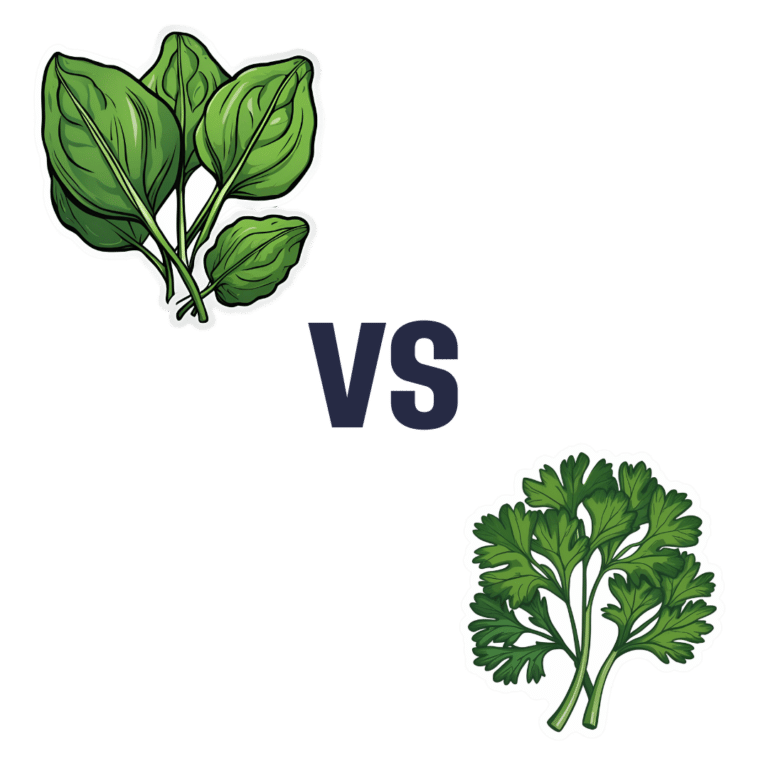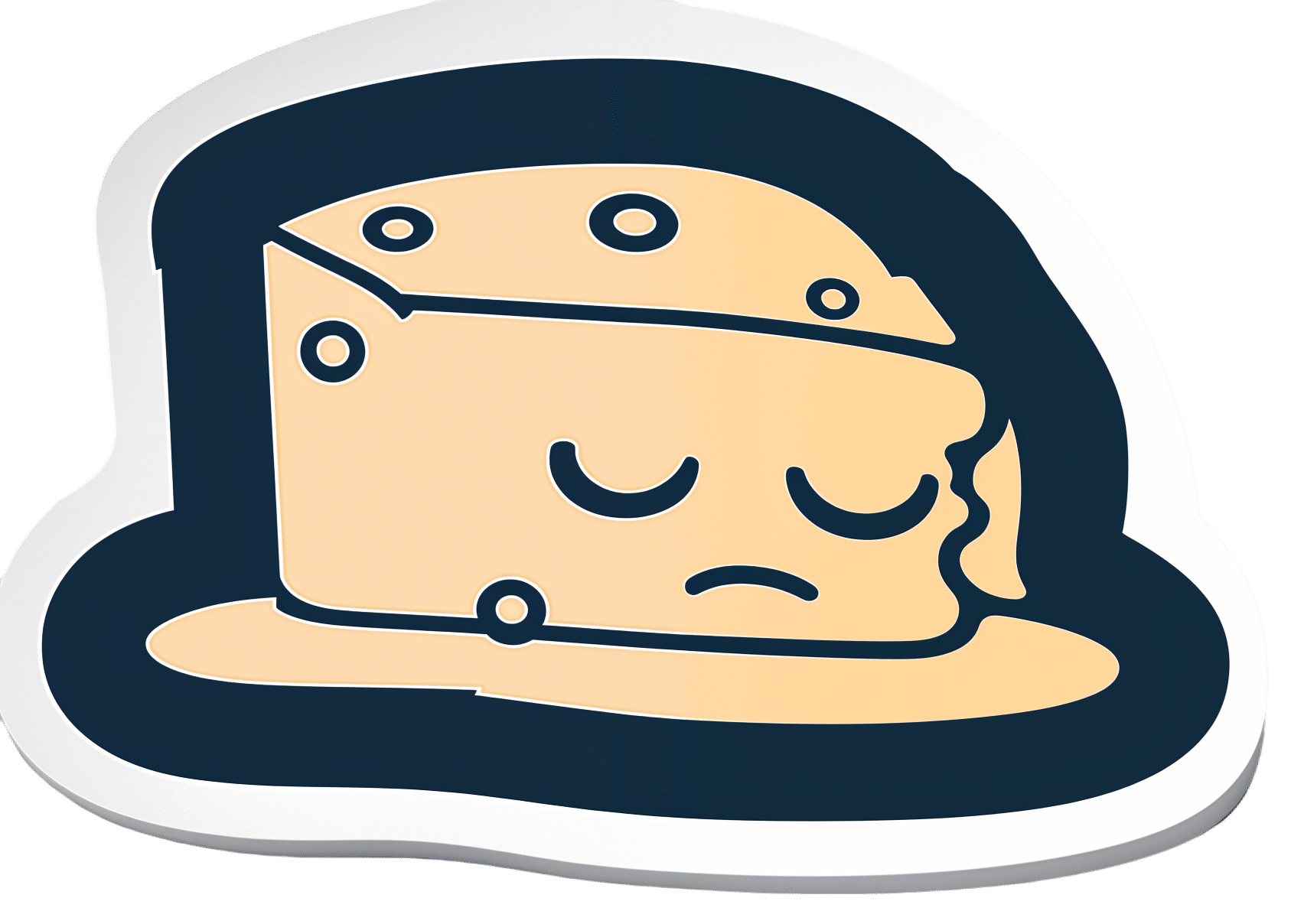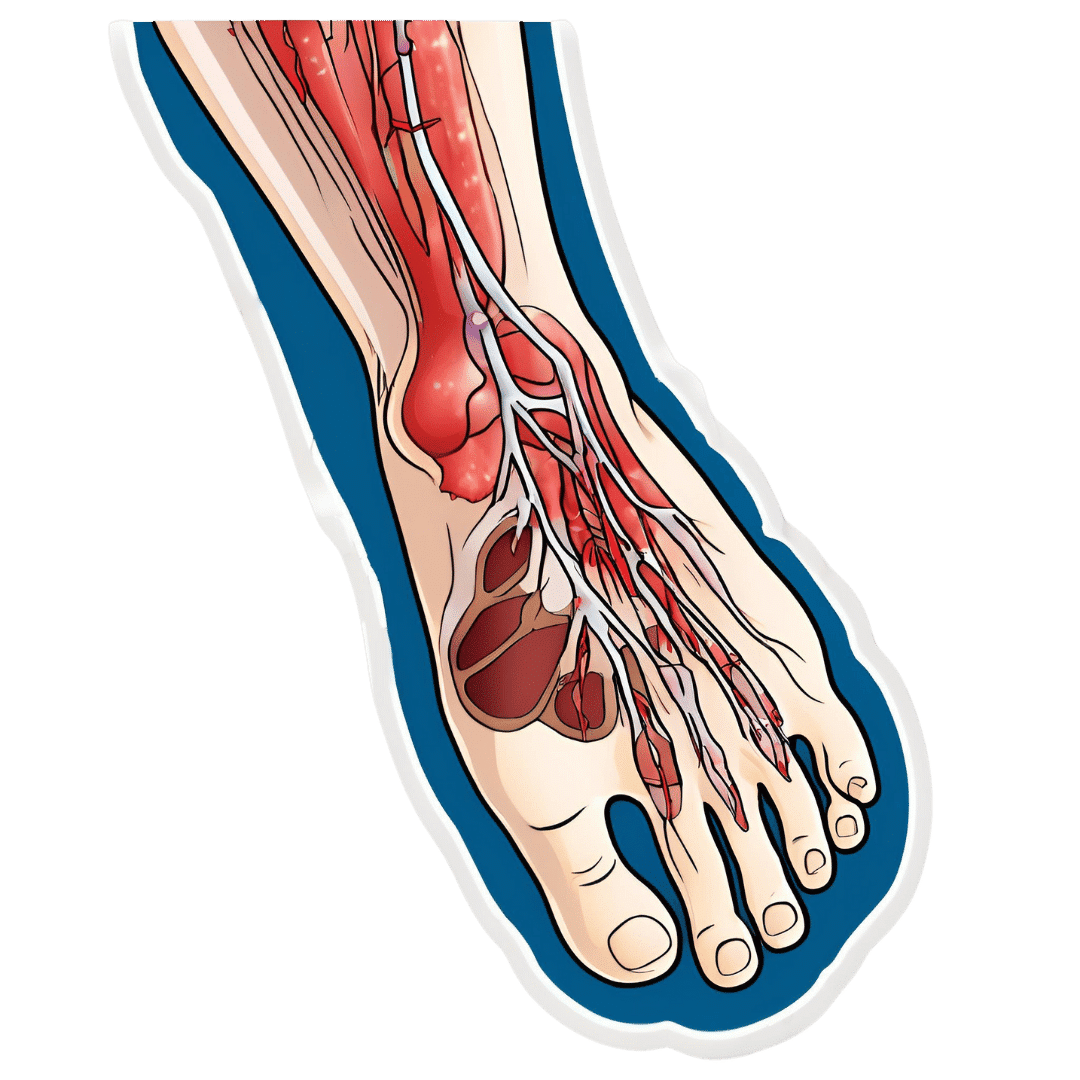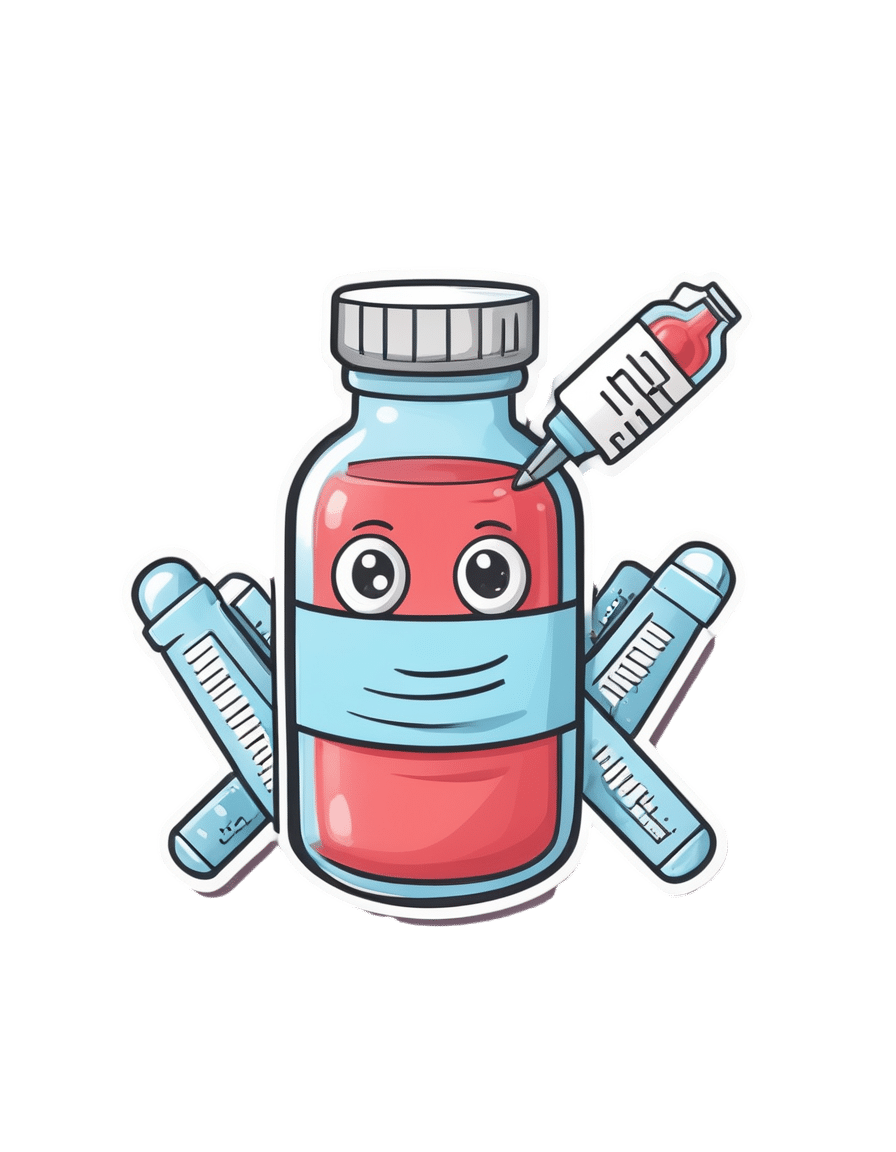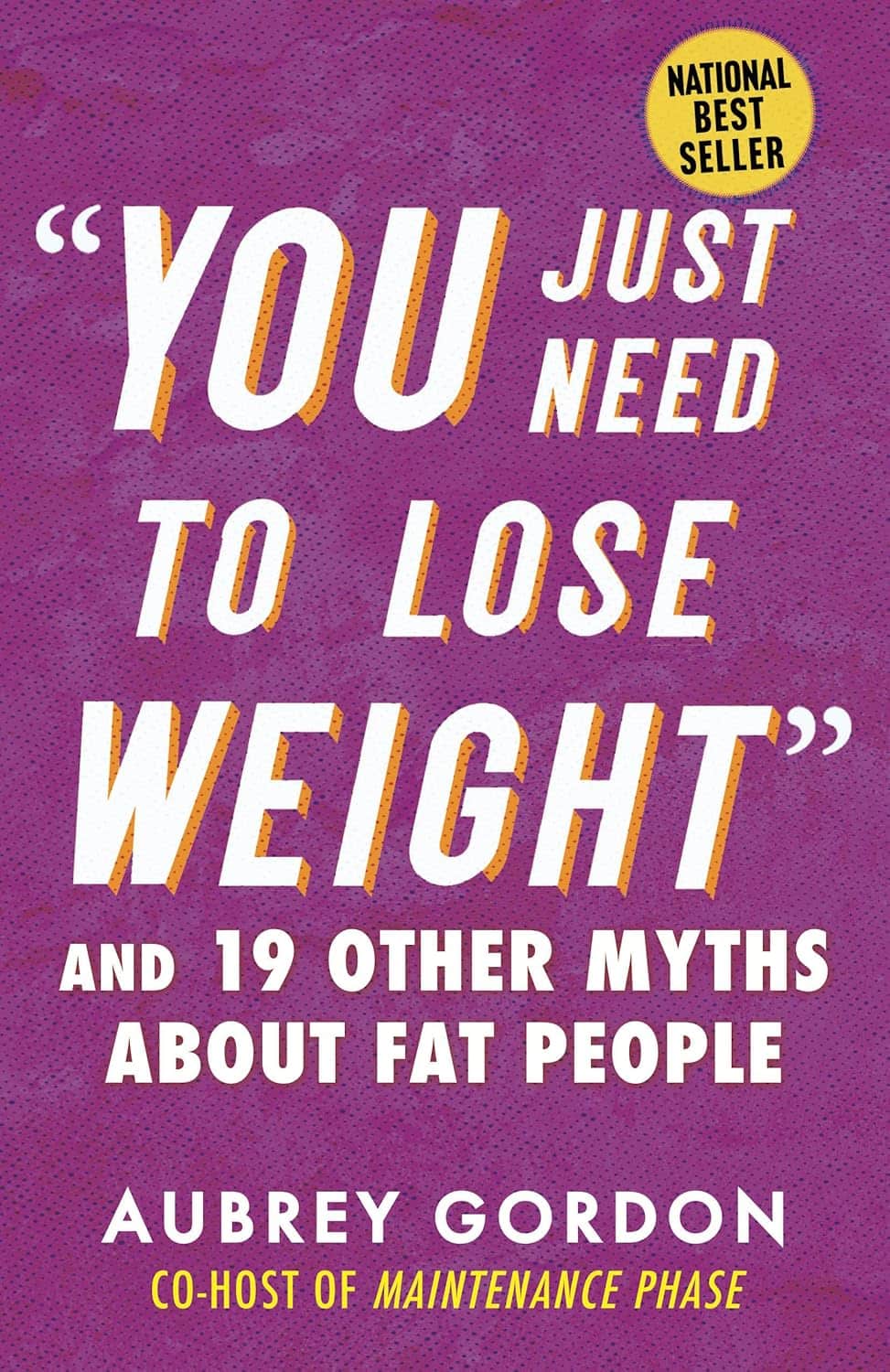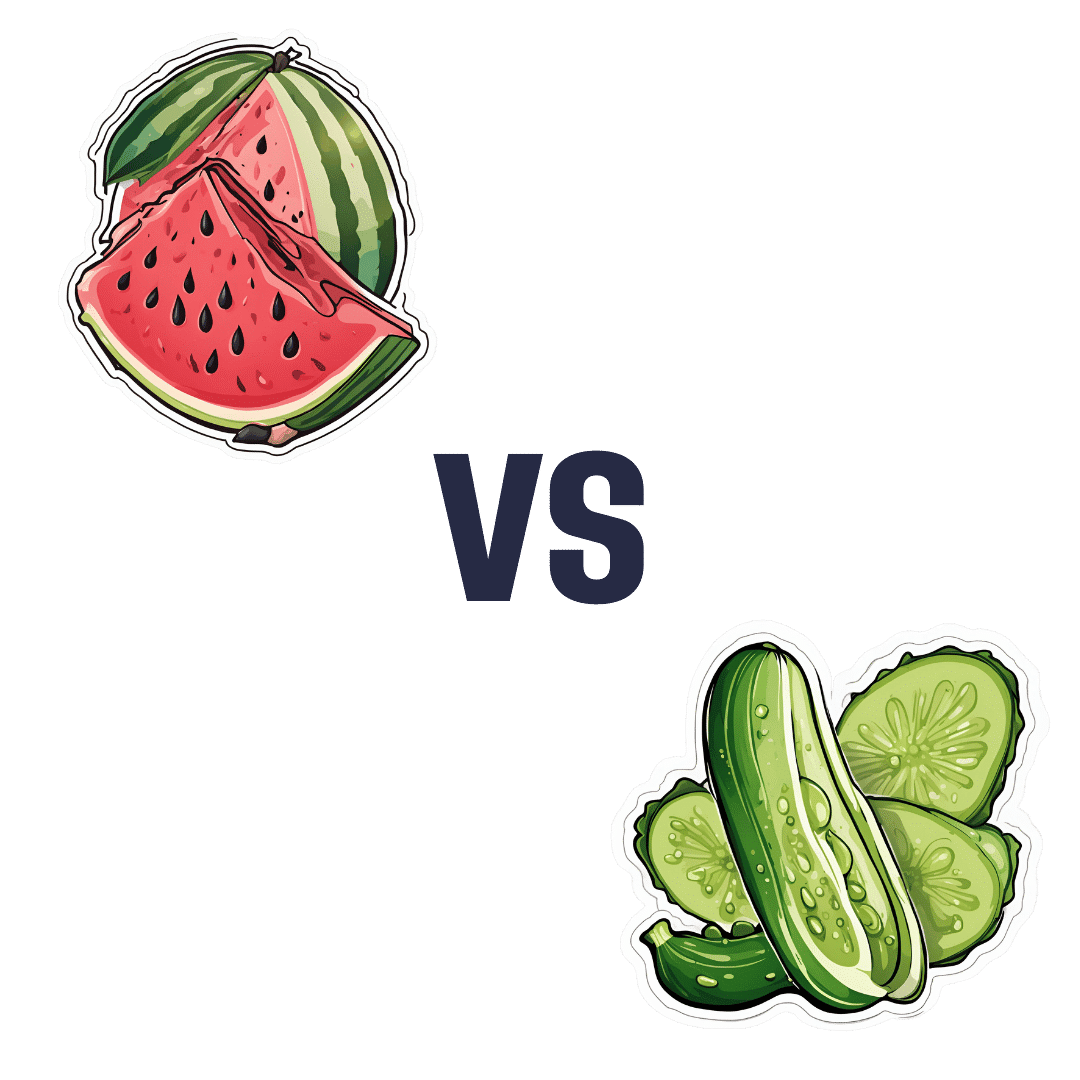
Watermelon vs Cucumber – Which is Healthier?
10almonds is reader-supported. We may, at no cost to you, receive a portion of sales if you purchase a product through a link in this article.
Our Verdict
When comparing watermelon to cucumber, we picked the cucumber.
Why?
Both are good! But in the battle of the “this is mostly water” salad items, cucumber wins out.
In terms of macros they both are, as we say, mostly water. However, watermelon contains more sugar for the same amount of fiber, contributing to cucumber having the lower glycemic index.
When it comes to vitamins, watermelon does a little better; watermelon has more of vitamins A, B1, B3, B6, C, and E, while cucumber has more of vitamins B2, B5, B9, K, and choline. So, a modest 6:5 win for watermelon.
In the category of minerals, it’s a different story; watermelon has more selenium, while cucumber has more calcium, iron, magnesium, manganese, phosphorus, potassium, and zinc.
Both contain an array of polyphenols; mostly different ones from each other.
As ever, enjoy both. However, adding up the sections, we say cucumber enjoys a marginal win here.
Want to learn more?
You might like to read:
Take care!
Don’t Forget…
Did you arrive here from our newsletter? Don’t forget to return to the email to continue learning!
Recommended
Learn to Age Gracefully
Join the 98k+ American women taking control of their health & aging with our 100% free (and fun!) daily emails:
-
Sweet Dreams Are Made Of Cheese (Or Are They?)
10almonds is reader-supported. We may, at no cost to you, receive a portion of sales if you purchase a product through a link in this article.
It’s Q&A Day at 10almonds!
Have a question or a request? You can always hit “reply” to any of our emails, or use the feedback widget at the bottom!
In cases where we’ve already covered something, we might link to what we wrote before, but will always be happy to revisit any of our topics again in the future too—there’s always more to say!
As ever: if the question/request can be answered briefly, we’ll do it here in our Q&A Thursday edition. If not, we’ll make a main feature of it shortly afterwards!
So, no question/request too big or small
❝In order to lose a little weight I have cut out cheese from my diet – and am finding that I am sleeping better. Would be interested in your views on cheese and sleep, and whether some types of cheese are worse for sleep than others. I don’t want to give up cheese entirely!❞
In principle, there’s nothing in cheese that, biochemically, should impair sleep. If anything, its tryptophan content could aid good sleep.
Tryptophan is found in many foods, including cheese, which (of common foods, anyway), for example cheddar cheese ranks second only to pumpkin seeds in tryptophan content.
Tryptophan can be converted by the body into 5-HTP, which you’ve maybe seen sold as a supplement. Its full name is 5-hydroxytryptophan.
5-HTP can, in turn, be used to make melatonin and/or serotonin. Which of those you will get more of, depends on what your body is being cued to do by ambient light/darkness, and other environmental cues.
If you are having cheese and then checking your phone, for instance, or otherwise hanging out where there are white/blue lights, then your body may dutifully convert the tryptophan into serotonin (calm wakefulness) instead of melatonin (drowsiness and sleep).
In short: the cheese will (in terms of this biochemical pathway, anyway) augment some sleep-inducing or wakefulness-inducing cues, depending on which are available.
You may be wondering: what about casein?
Casein is oft-touted as producing deep sleep, or disturbed sleep, or vivid dreams, or bad dreams. There’s no science to back any of this up, though the following research review is fascinating:
Dreams of the Rarebit Fiend: food and diet as instigators of bizarre and disturbing dreams
(it largely supports the null hypothesis of “not a causal factor” but does look at the many more likely alternative explanations, ranging from associated actually casual factors (such as alcohol and caffeine) and placebo/nocebo effect)
Finally, simple digestive issues may be the real thing at hand:
Worth noting that around two thirds of all people, including those who regularly enjoy dairy products, have some degree of lactose intolerance:
Lactose Intolerance in Adults: Biological Mechanism and Dietary Management
So, in terms of what cheese may be better/worse for you in this context, you might try experimenting with lactose-free cheese, which will help you identify whether that was the issue!
Share This Post
-
Natural Alternatives for Depression Treatment
10almonds is reader-supported. We may, at no cost to you, receive a portion of sales if you purchase a product through a link in this article.
Questions and Answers at 10almonds
Have a question or a request? You can always hit “reply” to any of our emails, or use the feedback widget at the bottom!
This newsletter has been growing a lot lately, and so have the questions/requests, and we love that! In cases where we’ve already covered something, we might link to what we wrote before, but will always be happy to revisit any of our topics again in the future too—there’s always more to say!
As ever: if the question/request can be answered briefly, we’ll do it here in our Q&A Thursday edition. If not, we’ll make a main feature of it shortly afterwards!
So, no question/request too big or small
Natural alternatives to medication for depression?
Great question! We did a mean feature a while back, but we definitely have much more to say! We’ll do another main feature soon, but in the meantime, here’s what we previously wrote:
See: The Mental Health First-Aid That You’ll Hopefully Never Need
^This covers not just the obvious, but also why the most common advice is not helpful, and practical tips to actually make manageable steps back to wellness, on days when “literally just survive the day” is one’s default goal.
Share This Post
-
How To Stay A Step Ahead Of Peripheral Artery Disease
10almonds is reader-supported. We may, at no cost to you, receive a portion of sales if you purchase a product through a link in this article.
Far less well-known than Coronary Artery Disease, it can still result in loss of life and limb (not in that order). Fortunately, there are ways to be on your guard:
What it is
Peripheral Artery Disease (PAD) is the same thing as Coronary Artery Disease (CAD), just, in the periphery—which by definition means “outside of the heart and brain”, but in practice, it starts with the extremities. And of the extremities, it tends to start with the feet and legs, for the simple reason that if someone’s circulation is sluggish, then because of gravity, that’s where’s going to get blocked first.
In both CAD and PAD, the usual root cause is atherosclerosis, that is to say, the build-up of fatty material inside the arteries, usually commensurate to LDL (“bad”) cholesterol, especially in men (high LDL is still a predictor of cardiovascular disease in women though, just more modestly so, at least pre-menopause or in cases of treated menopause whereby HRT has returned hormones to pre-menopause levels).
See also: Demystifying Cholesterol
And for that about sex differences: His & Hers: The Hidden Complexities of Statins and Cardiovascular Disease (CVD)
Why it is
This one’s straightforward, as it’s the same things as any kind of cardiovascular disease: high blood pressure, high cholesterol, older age, obesity, smoking, drinking, diabetes, and genetic factors (so, a risk factor is: family history of heart disease).
However, while those are the main causes and/or risk factors, it absolutely can still strike other people, so it’s as well to be watch out for…
What to look out for
Many people first notice signs and symptoms that turn out to be PAD when they experience pain or numbness in the foot or feet, and/or a discoloration of the feet (especially toes), and slow wound healing.
At that stage, chances are you will need to go urgently to a specialist, and surgery is a likely necessity. With a little luck, it’ll be a minimally-invasive surgery to unblock an artery; failing that, an amputation will be in order.
At that stage, under 50% will be alive 5 years from diagnosis:
You probably want to avoid those. Good news is, you can, by catching it earlier!
What to look out for before that
The most common test for PAD is one you can do at home, but enlisting a nurse to do it for you will help ensure accurate readings. It’s called the Ankle-Brachial Index (ABI) test, and it involves comparing the blood pressure in your ankle with the blood pressure in your arm, and expressing them as a ratio.
Here’s how to do it (instructions and a video demonstration if you want it):
Do Try This At Home: ABI Test For Clogged Arteries
If you need a blood pressure monitor, by the way, here’s an example product on Amazon.
- A healthy ABI score is between 1.0 and 1.4; anything outside this range may indicate arterial problems.
- Low ABI scores (below 0.8) suggest plaque is likely obstructing blood flow
- High ABI scores (above 1.4) may indicate artery hardening
Do note also that yes, if you have plaque obstructing blood flow and hardened arteries, your scores may cancel out and give you a “healthy” score, despite your arteries being very much not healthy.
For this reason, this test can be used to raise the alarm, but not to give the “all clear”.
There are other tests that clinicians can do for you, but you can’t do at home unless you have an MRI machine, a CT scanner, an x-ray machine, a doppler-and-ultrasound machine, etc. We’ll not go into those in detail here, but ask your doctor about them if you’re concerned.
What to do about it
In the mid-to-late stages of the disease, the options are medication and surgery, respectively, but your doctor will advise about those in that eventuality.
In the early stages of the disease, the first-line recommend treatment is exercise, of which, especially walking:
Lower Extremity Peripheral Artery Disease: Diagnosis and Treatment
Given that this more often happens when someone hasn’t been walking so much, it can be a walk-rest-walk approach at first (a treadmill on a low setting can be very useful for this):
See also: Exercise Comparison Head-to-Head: Treadmill vs Road
Take care!
Share This Post
Related Posts
-
Vaccines and cancer: The myth that won’t die
10almonds is reader-supported. We may, at no cost to you, receive a portion of sales if you purchase a product through a link in this article.
Two recent studies reported rising cancer rates among younger adults in the U.S. and worldwide. This prompted some online anti-vaccine accounts to link the studies’ findings to COVID-19 vaccines.
But, as with other myths, the data tells a very different story.
What you need to know
- Baseless claims that COVID-19 vaccines cause cancer have persisted online for several years and gained traction in late 2023.
- Two recent reports finding rising cancer rates among younger adults are based on pre-pandemic cancer incidence data. Cancer rates in the U.S. have been on the rise since the 1990s.
- There is no evidence of a link between COVID-19 vaccination and increased cancer risk.
False claims about COVID-19 vaccines began circulating months before the vaccines were available. Chief among these claims was misinformed speculation that vaccine mRNA could alter or integrate into vaccine recipients’ DNA.
It does not. But that didn’t prevent some on social media from spinning that claim into a persistent myth alleging that mRNA vaccines can cause or accelerate cancer growth. Anti-vaccine groups even coined the term “turbo cancer” to describe a fake phenomenon of abnormally aggressive cancers allegedly linked to COVID-19 vaccines.
They used the American Cancer Society’s 2024 cancer projection—based on incidence data through 2020—and a study of global cancer trends between 1999 and 2019 to bolster the false claims. This exposed the dishonesty at the heart of the anti-vaccine messaging, as data that predated the pandemic by decades was carelessly linked to COVID-19 vaccines in viral social media posts.
Some on social media cherry-pick data and use unfounded evidence because the claims that COVID-19 vaccines cause cancer are not true. According to the National Cancer Institute and American Cancer Society, there is no evidence of any link between COVID-19 vaccines and an increase in cancer diagnosis, progression, or remission.
Why does the vaccine cancer myth endure?
At the root of false cancer claims about COVID-19 vaccines is a long history of anti-vaccine figures falsely linking vaccines to cancer. Polio and HPV vaccines have both been the target of disproven cancer myths.
Not only do HPV vaccines not cause cancer, they are one of only two vaccines that prevent cancer.
In the case of polio vaccines, some early batches were contaminated with simian virus 40 (SV40), a virus that is known to cause cancer in some mammals but not humans. The contaminated batches were discovered, and no other vaccine has had SV40 contamination in over 60 years.
Follow-up studies found no increase in cancer rates in people who received the SV40-contaminated polio vaccine. Yet, vaccine opponents have for decades claimed that polio vaccines cause cancer.
Recycling of the SV40 myth
The SV40 myth resurfaced in 2023 when vaccine opponents claimed that COVID-19 vaccines contain the virus. In reality, a small, nonfunctional piece of the SV40 virus is used in the production of some COVID-19 vaccines. This DNA fragment, called the promoter, is commonly used in biomedical research and vaccine development and doesn’t remain in the finished product.
Crucially, the SV40 promoter used to produce COVID-19 vaccines doesn’t contain the part of the virus that enters the cell nucleus and is associated with cancer-causing properties in some animals. The promoter also lacks the ability to survive on its own inside the cell or interact with DNA. In other words, it poses no risk to humans.
Over 5.6 billion people worldwide have received COVID-19 vaccines since December 2020. At that scale, even the tiniest increase in cancer rates in vaccinated populations would equal hundreds of thousands of excess cancer diagnoses and deaths. The evidence for alleged vaccine-linked cancer would be observed in real incidence, treatment, and mortality data, not social media anecdotes or unverifiable reports.
This article first appeared on Public Good News and is republished here under a Creative Commons license.
Don’t Forget…
Did you arrive here from our newsletter? Don’t forget to return to the email to continue learning!
Learn to Age Gracefully
Join the 98k+ American women taking control of their health & aging with our 100% free (and fun!) daily emails:
-
“You Just Need to Lose Weight” And 19 Other Myths About Fat People – by Aubrey Gordon
10almonds is reader-supported. We may, at no cost to you, receive a portion of sales if you purchase a product through a link in this article.
We’ve previously reviewed another book by this author, “What We Don’t Talk About When We Talk About Fat”, and this time, she’s doing some important mythbusting.
The titular “you just need to lose weight” is a commonly-taken easy-out for many doctors, to avoid having to dispense actual treatment for an actual condition. Whether or not weight loss would help in a given situation is often immaterial; “kicking the can down the road” is the goal.
Most of the book is divided into 20 chapters, each of them devoted to debunking one myth. Think of it like 10almonds’ “Mythbusting Friday” edition (indeed, we did one about obesity), but with an entire book, and as much room as she needs to provide much more detail than we can ever get into in a single article.
And far from being a mere polemic, she does indeed provide that detail—this is clearly a very well-researched book, above and beyond the author’s own personal experience. Further, all the key points are illustrated and articulated clearly, making the book’s ideas very comprehensible.
The style is pop-science, but with frequent bibliographical references for relevant sources.
Bottom line: for some readers, this book will come as a great validation; for others, it may be eye-opening. Either way, it’s a very worthwhile read.
Don’t Forget…
Did you arrive here from our newsletter? Don’t forget to return to the email to continue learning!
Learn to Age Gracefully
Join the 98k+ American women taking control of their health & aging with our 100% free (and fun!) daily emails:
-
Online Reaction Tests & Women’s Cognitive Health (Test Yours!)
10almonds is reader-supported. We may, at no cost to you, receive a portion of sales if you purchase a product through a link in this article.
A team of researchers have looked into the use of online reaction tests (in which, for example, one clicks whenever a certain prompt is shown, or for more of a cognitive challenge, one presses a numerical key when the corresponding digit is shown) to cognitive health in women at different ages.
Why women? To quote the man who had the honor of being the first-listed author on the study (something that happens mysteriously often in science),
❝Women have long been under-represented in healthy aging research, despite making up more than half the population. We developed an easy way to measure cognitive function in the home, without the need for individuals to travel to clinics or receive home visits. Our research shows that testing of cognitive function in the home largely acceptable, easy and convenient❞
About that convenience: they used data from the UK Women’s Cohort Study, which involved over 35,000 British women, and then specifically focused on a follow-up study of 768 participants aged 48–85.
Of the two kinds of online reaction tests we described up top, they used the numerical kind. The participants also filled in a questionnaire about their personal traits (demographic data, mostly, though things like self-reported level of health literacy, and how they would rate their overall health).
What they found
The findings included:
- Younger women were more likely to participate, with participation rates dropping from 89% at age 45 to 44% at age 65.
- Each higher level of education increased the likelihood of volunteering by 7%.
- Women who rated themselves as having “high” intelligence were 19% more likely to participate than those who considered themselves of “average” intelligence.
- Women with lower self-reported health literacy made fewer errors, possibly due to taking longer to decide on answers—consistent with findings from older adults.
You can read the full paper itself here: Health literacy in relation to web-based measurement of cognitive function in the home: UK Women’s Cohort Study
Why this matters
We wrote, a little while ago, about the use of online games (of a specific kind) to improve cognitive function:
Synergistic Brain-Training: Let The Games Begin (But It Matters What Kind) ← the good news is, these are very accessible too
When it comes to rapid and/but correct reactions, this becomes really critical:
How (And Why) To Train Your Pre-Frontal Cortex ← Dr. Sandra Chapman advocates strongly for this, and it’s closely related to working memory and the ability to focus
Want to test yours?
Here are two ways to do it (now, for free, without needing to sign up for anything; the tests are right there on the page):
- HumanBenchmark.com’s Reaction Time Test ← this one’s just a “click when the red panel turns green” test, but the merit here is that it compares your scores to a very large dataset of other people
- Keypress Reaction Time Test ← this one’s the kind that was used in the study, and requires pressing the correct numerical key when the corresponding digit is shown on the screen. You can make it easier or harder by restricting or increasing the range of numbers it uses (default setting is to use the numbers 1, 2, 3, 4, 5, and 6)
Enjoy!
Don’t Forget…
Did you arrive here from our newsletter? Don’t forget to return to the email to continue learning!
Learn to Age Gracefully
Join the 98k+ American women taking control of their health & aging with our 100% free (and fun!) daily emails:

